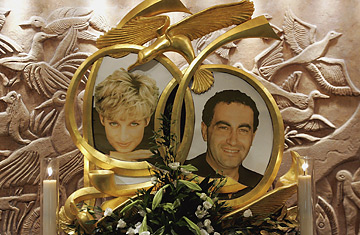
Candles burn beside The Diana, Princess of Wales and Dodi Fayed memorial in Harrods on January 8, 2006 in London, England.
The judges said that the main reason for their ruling was to protect the interests of public safety. Diana and Dodi Fayed were killed in Paris when their driver, trying to escape the paparazzi who had followed them from the Ritz Hotel, crashed into a pillar in the Pont de l'Alma tunnel. The judges argued that only a jury would be able to make appropriate recommendations on changing the law to stop paparazzi from harassing celebrities in the future. They also said that the "immense public interest" in the case worldwide called for transparency and made a jury necessary. And they referred to Al Fayed's claims that the crash was no accident, saying that if Butler-Sloss decides the inquests should look into the allegations, "the possible role of state agents" was another reason that a jury should hear the case. (The jury would not rule on who is to blame for Diana and Dodi's deaths, but they could rule on whether or not the crash was an accident, which, if they decide it wasn't, could then lead to a separate criminal trial.) After the ruling, Al Fayed said in a statement: "This is not the end of the road, but an important step. The jury must now be allowed to hear the entirety of the evidence, but I fear there will be attempts to keep it from them. If so, that will be yet another battle I will have to fight."
In January, Butler-Sloss, who was one of Britain's top judges before she retired, decided to preside over the case alone because she thought that the volume and detail of the evidence would be too much for a jury to handle. She said that only a coroner could give the "careful and fully reasoned decision" that the inquests required. Her ruling seemed to go against the wishes of Princes William and Harry, who a week earlier had sent a letter to Butler-Sloss asking that the inquest "not only be open, fair and transparent, but that it should move swiftly to a conclusion."
Al Fayed's challenge to Butler-Sloss' decision also took issue with the fact that she was presiding over the inquest as royal deputy coroner, which gave the perception that she "lacked [the] independence" needed to remain impartial in judging whether or not the Princess and Dodi Fayed were murdered. The High Court judges agreed, ruling that if Butler-Sloss is still going to hear the case, she can't do it as the royal coroner.
The inquest, which has been postponed several times for a series of police investigations in France and Britain, is due to start in May. "I am encouraged by today's judgment and now hope that justice can be done without further attempts to impair the process," the Egypt-born Al Fayed said in his statement. "All I have ever asked for is fair play. When I grew up, fair play was said to be the unofficial religion of the British Empire. It may have been then, but I have seen precious little of it since."
